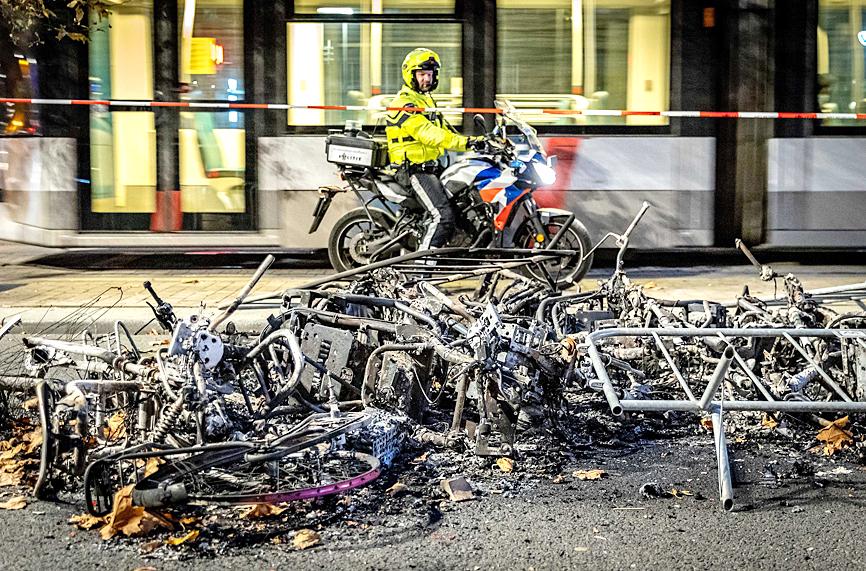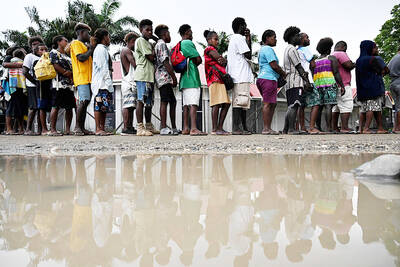When COVID-19 riots rocked the Netherlands for the second time in a year, Ricardo Pronk was there to livestream it all to his followers on social media.
The 50-year-old anti-vaccination activist administered a Facebook group with 10,000 followers, which had shared a call for a demonstration in the port city of Rotterdam on Nov. 19 that later turned violent.
The group, which was recently removed by Facebook, is part of a network of conspiracy theorists and COVID-19-deniers on social media that reached as far as the Dutch parliament, whose influence has sparked concern among experts.

Photo: EPA-EFE
For Pronk, vaccines “are weapons made to kill.”
He also embraces the QAnon conspiracy group’s narrative about “satanic child abuse” by a “globalized elite.”
Yet the unemployed former computer technician, who chose a banner for the group with a lion against a backdrop of flames, rejects any responsibility for the unrest in the Netherlands.
Five people were shot when police opened fire in Rotterdam, and riots spread around the country for the next three days.
“Violence is not the best way, of course not. The best is to do things peacefully,” he said.
In January, during the Netherlands’ worst riots in 40 years over a curfew, and during last week’s unrest, social media were used not only to organize protests, but also to spread disinformation.
“What is unique about the Netherlands is that we have repeatedly seen COVID protests turn into riots just this year,” said Ciaran O’Connor, an analyst at the Institute for Strategic Dialogue in London, which specializes in countering radicalism.
While Dutch Prime Minister Mark Rutte has branded rioters “scum” and “idiots,” O’Connor pointed the finger at the epidemic of conspiracy theories on the Internet in the Netherlands.
On Facebook alone, the top 125 groups disseminating false information about COVID-19 saw a 63 percent rise in followers in six months, comprising 789,000 members in the country of 17 million people, an Institute for Strategic Dialogue study said.
Telegram groups during this month’s riots were filled with plans for demonstrations, calls for riots, along with messages targeting Muslims, Jews and gay people.
The social media groups “usually don’t call for violence, but they may accept it as part of the solution,” O’Connor said. “The anti-vax and anti-COVID movement is creating a space allowing for other forces to engage and express their frustration in a violent way.”
Authorities in the Netherlands blamed the riots on a variety of culprits, ranging from frustrated young people to soccer hooligans and genuine coronavirus protesters — but they also underlined the importance of social media in organizing them.
In June, Dutch intelligence services said they feared that anti-government demonstrations “are a breeding ground for extremism.”
In a country where 85 percent of adults are vaccinated, the anti-vax movement “is a clear minority group,” said Claes de Vreese, a professor of political communication at the University of Amsterdam.
However, unlike in neighboring countries, “their voice has been strongly amplified by the fact that they have found a political ally in parliament,” namely the Forum for Democracy party.
The leader of the far-right party, Thierry Baudet, has largely dropped his anti-immigration rhetoric to adopt a strong anti-vaccination stance and to promote conspiracy theories.
Baudet has been dubbed the Dutch Donald Trump and one of his tweets was labeled misleading by Twitter ahead of elections in March, a first for a Dutch politician.
One of the party’s lawmakers was recently reprimanded for threatening a fellow lawmaker in parliament with a “tribunal” if the Forum came to power, because of his support for the government’s policies.
O’Connor said that some material was slipping under the radar of social media giants because it was in Dutch.
“Compared to the US or the UK, Twitter or Facebook don’t have the same focus on gatekeeping their platforms against people who use them irresponsibly,” he said.

SEEKING CHANGE: A hospital worker said she did not vote in previous elections, but ‘now I can see that maybe my vote can change the system and the country’ Voting closed yesterday across the Solomon Islands in the south Pacific nation’s first general election since the government switched diplomatic allegiance from Taiwan to Beijing and struck a secret security pact that has raised fears of the Chinese navy gaining a foothold in the region. The Solomon Islands’ closer relationship with China and a troubled domestic economy weighed on voters’ minds as they cast their ballots. As many as 420,000 registered voters had their say across 50 national seats. For the first time, the national vote also coincided with elections for eight of the 10 local governments. Esther Maeluma cast her vote in the
Nearly half of China’s major cities are suffering “moderate to severe” levels of subsidence, putting millions of people at risk of flooding, especially as sea levels rise, according to a study of nationwide satellite data released yesterday. The authors of the paper, published by the journal Science, found that 45 percent of China’s urban land was sinking faster than 3mm per year, with 16 percent at more than 10mm per year, driven not only by declining water tables, but also the sheer weight of the built environment. With China’s urban population already in excess of 900 million people, “even a small portion

UNSETTLING IMAGES: The scene took place in front of TV crews covering the Trump trial, with a CNN anchor calling it an ‘emotional and unbelievably disturbing moment’ A man who doused himself in an accelerant and set himself on fire outside the courthouse where former US president Donald Trump is on trial has died, police said yesterday. The New York City Police Department (NYPD) said the man was declared dead by staff at an area hospital. The man was in Collect Pond Park at about 1:30pm on Friday when he took out pamphlets espousing conspiracy theories, tossed them around, then doused himself in an accelerant and set himself on fire, officials and witnesses said. A large number of police officers were nearby when it happened. Some officers and bystanders rushed

HYPOCRISY? The Chinese Ministry of Foreign Affairs yesterday asked whether Biden was talking about China or the US when he used the word ‘xenophobic’ US President Joe Biden on Wednesday called for a hike in steel tariffs on China, accusing Beijing of cheating as he spoke at a campaign event in Pennsylvania. Biden accused China of xenophobia, too, in a speech to union members in Pittsburgh. “They’re not competing, they’re cheating. They’re cheating and we’ve seen the damage here in America,” Biden said. Chinese steel companies “don’t need to worry about making a profit because the Chinese government is subsidizing them so heavily,” he said. Biden said he had called for the US Trade Representative to triple the tariff rates for Chinese steel and aluminum if Beijing was